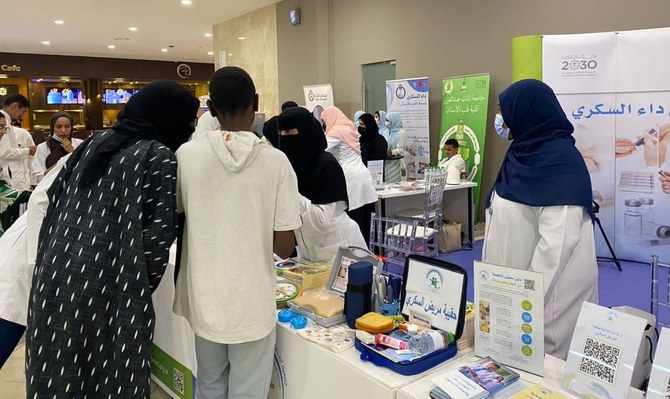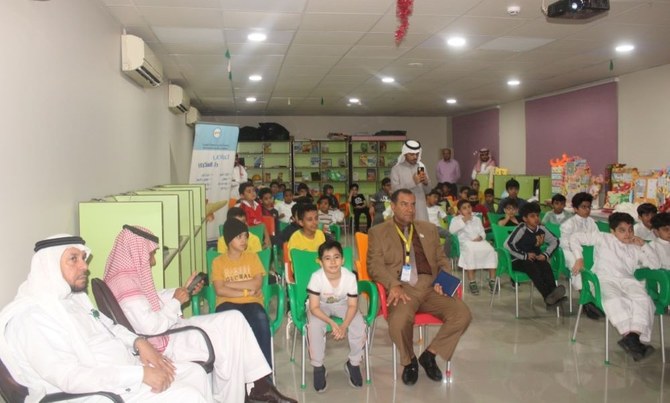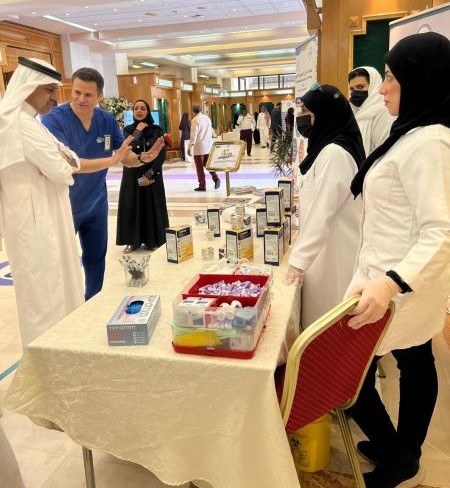JEDDAH/RIYADH: Saudi schools, hospitals, and universities are marking World Diabetes Day on Nov. 14 with education campaigns on the disease’s health risks and its potential to kill.
Around 73 million people in the Middle East and North Africa have been diagnosed with diabetes. That number is forecast to balloon to 135.7 million by 2045.
In Saudi Arabia, 4,274,100 adults — almost one in five — have a form of the disease, according to the International Diabetic Federation MENA region.
Saudi Arabia is part of the 21 member countries in the federation’s regional organization. Member associations include Saudi Charitable Association of Diabetes, the Saudi Diabetes and Endocrine Association, and the Saudi Society of Endocrinology and Metabolism.
Dr. Selwa Al-Hazza’a, a senior consultant ophthalmologist and professor, told Arab News that awareness of diabetes was crucial.
“Unfortunately, people do not know that diabetes causes diabetic eye disease and this complication is usually at the top of the concerns as it might cause blindness,” she said, adding other complications included heart disease, strokes, kidney failure, loss of sensation and gangrene.
The Society of Diabetic Patient Friends in Jeddah has launched educational and awareness programs to alert community members about the dangers of diabetes complications.
With 126 awareness activities, the society says it is assisting over 12,562 beneficiaries in Jeddah.
Asma’a Al-Harthy, clinical dietitian and diabetic educator from the society, told Arab News that it operates as a mobile diabetes clinic that provides awareness campaigns throughout the year, and campaigns generally increase in November.
“Obesity, lack of movement, and unhealthy eating habits all lead to type 2 diabetes. We offer medications (and) consultations. Our aim is to educate about this silent killer.”
The first educational and awareness campaign in Jeddah for World Diabetes Day was held on Nov. 3, under the slogan “Check your sugar”. Health experts provided blood sugar analysis, advice on therapeutic nutrition and education on type 1 and type 2 diabetes.
The Society of Diabetic Patient Friends and King Abdulaziz University Hospital will hold another awareness campaign in Jeddah on the day itself offering check-ups, blood sugar analysis, free medical consultations and free insulin pumps.
The society also provides awareness campaigns in malls, companies, universities, hospitals, and schools.
During this month, the Society provided training for more than 200 health counselors from Jeddah schools to shed light on the rights of students with diabetes and to ensure the proper provision of health care is given due to the increase in the number of diabetic children in the Kingdom.
“The main objective of the workshops was to guide the health counselor on how to deal with high blood sugar in children to control the condition or prevent it from happening in the first place. In this way, we will have a conscious generation, and we will be able to save the lives of many,” she added.
Sahar Amer, general supervisor of Children’s World International schools in Jeddah, told Arab News: “We pay attention to diet and health awareness for all students, starting with mental and general health and proper nutrition in order to avoid many diseases, including diabetes.”
Offering daily sports classes is one of the school’s initiatives to reduce the risk of diabetes among children, as movement helps to burn calories and reduce blood sugar levels.
“We provide an integrated program on World Diabetes Day, World Breast Cancer Day, Smoking, and Mental Health Day, where we talk to students in both Arabic and English to provide them with full awareness to maintain their health, and we invite parents to participate.”
Non-diabetic students are also alerted about their diabetic friends in the same class and how to deal with them in emergencies. A nurse is available at the school to monitor blood sugar levels and supervise the meals eaten to avoid any complications.
Amer said: “We make sure to make the diabetic child feel normal among classmates, and we do not prevent students from eating sweets completely, rather we specify the appropriate amount suitable for their condition, and educate them on how to choose a healthier alternative.”
Under the theme "Education To Protect Tomorrow," SACD took the initiative for World Diabetes Day with the General Education Administration and implemented its awareness and educational program on diabetes in schools of Riyadh and Al-Madinah regions.
In Riyadh, Riyadh Schools participated in SCAD’s awareness campaign programs on November 7 to further support the diabetic community.
In an all-inclusive diabetes awareness campaign, SCAD also partnered up with Sa3ee for The Rehabilitation and Employment for Disabilities in Riyadh on Nov. 6.
A health education event was held on the same day at Taibah University in Al-Madinah in cooperation with the Saudi German Hospital and Dr. Wafaa Tulbah Clinics.
High school students at Al-Aws Private National School in Al-Madinah participated in a walk at the Islamic University walkway held for World Diabetes Day on Nov. 9, in cooperation with the Ministry of Sports and SCAD.
On the same day, SCAD held an awareness program on diabetes in the international primary school Al-Qalaa Al-Hijazya in Madinah, which included a lecture, educational advice, and content.
At Abdullah bin Abbas Intermediate School, SCAD gave educational lectures and distributed glucose monitoring devices to students.
On Nov. 8 in Al-Madinah, SCAD answered questions and handed the children at the 69th Kindergarten school giveaways pertaining to World Diabetes Day.
Created in 1991 by IDF and the World Health Organization, World Diabetes Day became an official day in 2006 when the UN passed the 61/225 Resolution to combat the disease
World Diabetes Day campaigns reach more than one billion people in around 160 countries.
Nov. 14 is the birthday of the co-discoverer of insulin in 1922, Sir Frederick Banting.


































